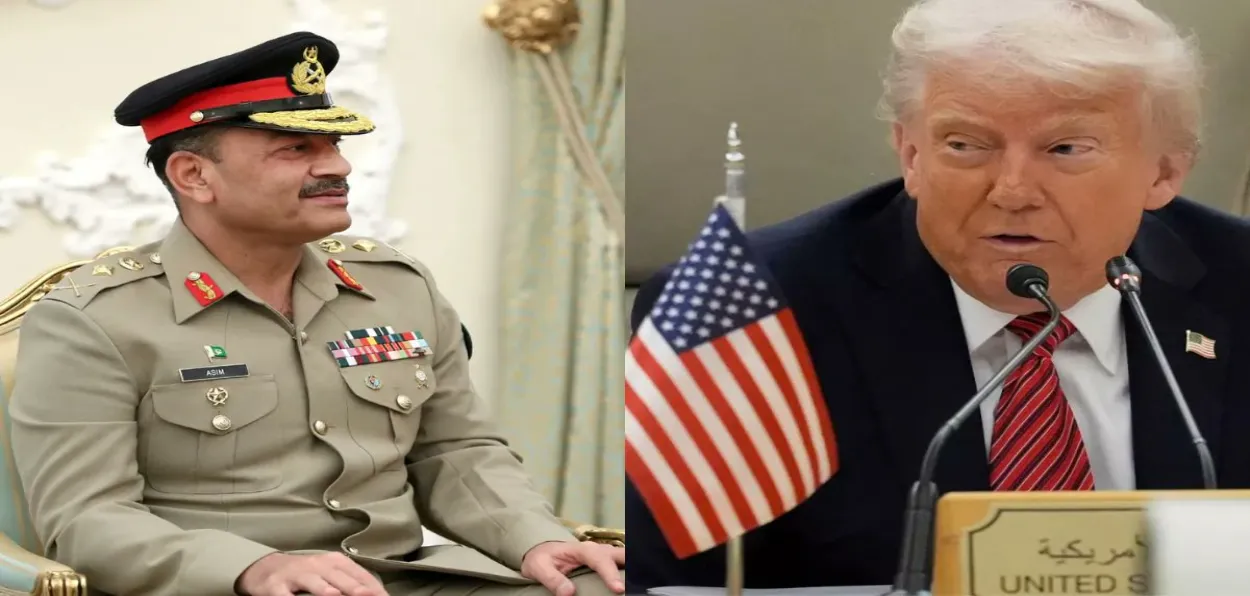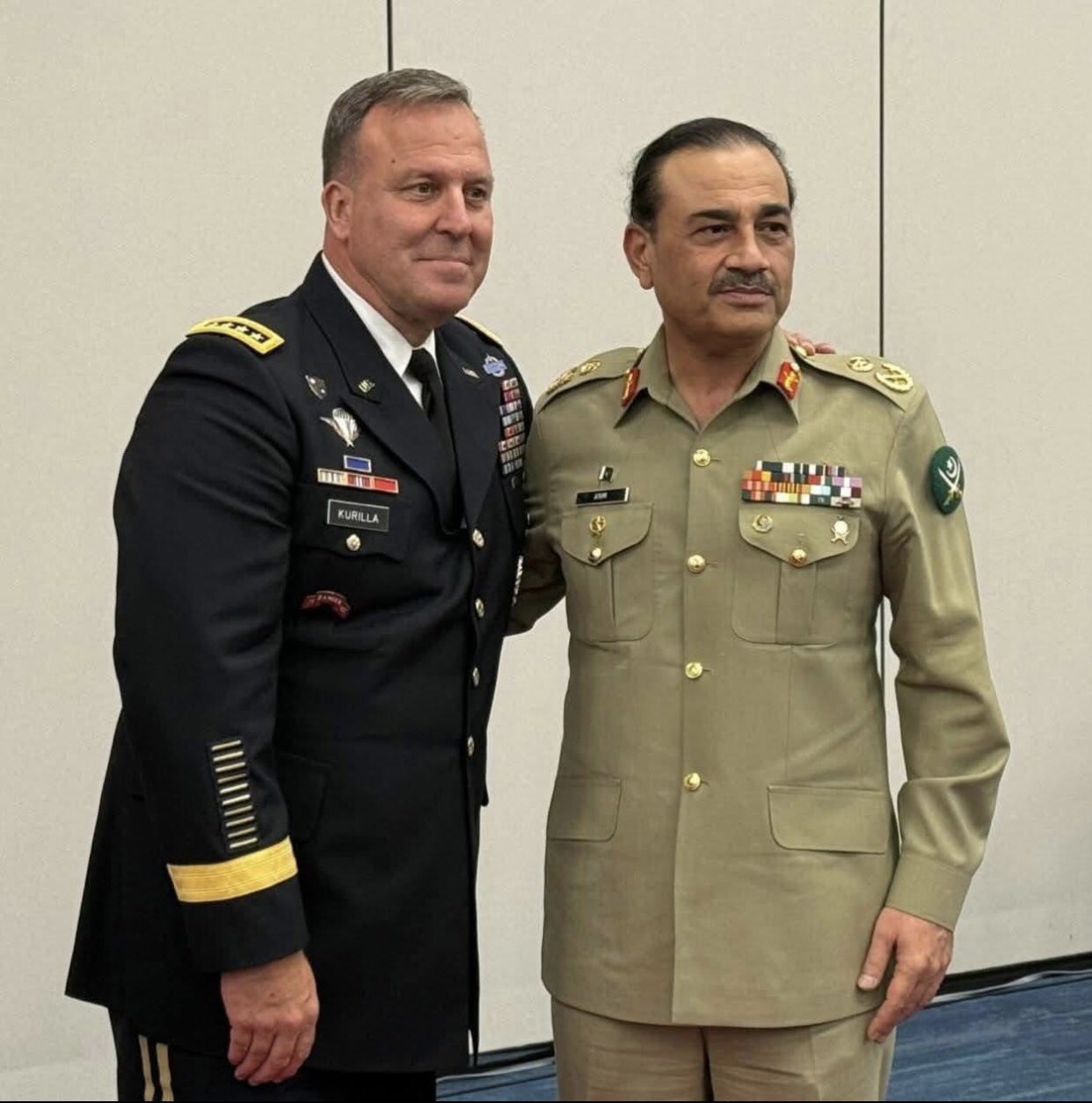
 Shankar Kumar
Shankar Kumar
In the more than six months since Donald Trump's march into the White House as the 47th US President, he has ensured that America’s foreign policy remains aligned with his whims. While he has weaponized the US’s economic power to bully trusted and long-standing allies, his administration has lost no time in tearing asunder America’s adherence to multilateralism.
Amid India-US tension over tariffs, the Trump administration’s love for Pakistan knows no bounds. Pakistan Army Chief General Asim Munir is in the US. again. He held consultations with his American counterparts.
Wooing Pakistani Army chief - who was hosted at the White House, barely weeks after Islamabad and New Delhi were engaged in a four-day military conflict - Operation Sindoor - over the killing of 26 people in Pahalgam in J&K by Pakistani terrorists, sends signals to India.
Trump’s bizarre triumphalism
Those who have been witness to Trump’s approach towards Pakistan during his first presidential term, when he had called out Islamabad for its “lies and deceit” on fighting terror, appear to be shocked by the US President’s unusual somersault on Pakistan.
“The United States has foolishly given Pakistan more than 33 billion dollars in aid over the last 15 years, and they have given us nothing but lies & deceit, thinking of our leaders as fools. They give haven to the terrorists we hunt in Afghanistan, with little help. No more!” Trump had said in his post on Twitter (now X) on January 1, 2018.
Delhi sees it as a broa broaderader pattern in the Trump administration’s strategy to make New Delhi dance to its tune on every issue. For example, Trump has claimed more than 30 times that he intervened to bring a ceasefire between India and Pakistan in May. India has consistently and firmly dismissed these assertions as baseless bluster.
 Pakistani Army Chief Asim Munir with a US General, during his recent US visit
Pakistani Army Chief Asim Munir with a US General, during his recent US visit
From Prime Minister Narendra Modi to External Affairs Minister Dr S Jaishankar and Foreign Secretary Vikram Misri—everyone has made it clear that the ceasefire with Pakistan was following repeated requests from Islamabad to India for stoping its military operation against Pakistan.
Moreover, Prime Minister Modi recently told Parliament that no world leader had asked India to stop its ‘Operation Sindoor’ against Pakistan. For Trump, such a statement came as a bolt from the blue. India did not support Trump's aspiration to get a Nobel Peace Prize nomination, and a visibly incensed President retaliated by signing a new trade agreement with Pakistan.
Trump’s energy gamble with Pakistan
On July 31, Washington, D.C., and Islamabad signed a deal for the joint development of oil reserves in Pakistan, a move that surprised even Pakistanis. So far, Pakistan has not struck an oil field which are of any worth. For years, Pakistan claimed that it had undersea energy reserves. In 2019, the country’s then Prime Minister Imran Khan announced that huge reserves of oil and gas had been discovered some 280 km off the Karachi coast.
When drilling was undertaken at Kekra-1, located 280 km off the Karachi coast, nothing could be found. The US’s oil and gas company Exxon Mobil Corp, Italian oil company Eni SpA, Pakistan’s Oil &Gas Development Company Limited, and Pakistan Petroleum Ltd were involved in the exploration.
In June 2023, Shell, a British multinational oil and gas company, announced that it was selling its stake in the oil business in Pakistan to Aramco, but the Saudi Arabia-based company reportedly gave a muted response to the British company. Similarly, an auction for 18 oil and gas blocks found no international bidders, according to The Nation.
Last year, Pakistan again tried to lure in international companies to undertake exploration in its oil blocks. Bids were floated for six blocks in the Indus offshore basin. However, more than a year has passed, and no oil and gas company has come forward to secure any of the blocks. In July 2024, exasperated Musadik Malik, Pakistan’s Petroleum Minister, reportedly told a parliamentary committee that no international companies were interested in offshore oil and gas exploration in the country.
Ironically, even within Pakistan, few are willing to vouch for such claims. This is apparent as between 2021 and 2024, four multinational oil and gas companies---from Total Energies to Italy’s ENI to Kuwait Foreign Petroleum Exploration Company and Britain’s Shell have exited from their business in Pakistan. In this background, Trump’s apparent taunt about Pakistan someday selling oil to India sounds less like a forecast and more like a farce.
Trump’s tariff war against India
Since President Trump's main objective is to force India to bend to his dictates, he has slapped an extra 25% tariff in addition to the same imposed earlier on Indian exports to the US. In contrast, Pakistan, well known for hosting Osama bin Laden, the al-Qaeda chief who was the key architect of the deadliest terrorist attack on America on September 11, 2001, has been slapped with a 19% tariff.
While it shows President Trump’s unwillingness to call a spade a spade, his decision to punish India with hiked tariffs for purchasing oil from Russia is seen more as a geopolitical tantrum than a coherent policy move.
Trump says India’s oil purchase from Russia is fueling the war against Ukraine. He has forgotten that China and the European Union purchase more energy from Russia than India. China reportedly imported $62.6 billion worth of Russian oil in 2024, while the European Union, as per the Centre for Research on Energy and Clean Air (CREA), has contributed 23% to Russia’s fossil fuel export revenues since the Ukraine war began in February 2022. In contrast, India has contributed 13% to Moscow’s fossil fuel export revenue.
“The European Union in 2024 had a bilateral trade of Euro 67.5 billion in goods with Russia. In addition, it had trade in services estimated at Euro 17.2 billion in 2023. This is significantly more than India’s total trade with Russia that year or subsequently. European imports of LNG in 2024 reached a record 16.5 million tons, surpassing the last record of 15.21 million tons in 2022,” the Ministry of External Affairs said, exposing the double standards of the US.
Mincing no words, the Ministry further said Europe’s trade with Russia extends far beyond energy, encompassing “fertilizers, mining products, chemicals, iron and steel, and machinery and transport equipment.” It also laid bare the US’s duplicity in its trade with Russia. The US continues to “import from Russia uranium hexafluoride for its nuclear industry, palladium for its EV industry, fertilizers as well as chemicals,” the MEA said, holding up a mirror to America’s hypocrisy in unfairly singling out India.
India’s intelligent strategic move
India, the world’s 4th largest economy, is well-prepared to face the US’s unilateral challenge against it. This is evident in its intelligent weaving of geopolitical strategy to counter Trump’s selective targeting against it.
Prime Minister Narendra Modi, who has not made any trip to China since 2018, as relations between the two countries worsened, particularly after the Galwan Valley incident in June 2020, is likely to visit Tianjin to attend the leadership summit of the Shanghai Cooperation Organisation to be held from August 31 to September 1.
People familiar with the matter said Prime Minister Modi’s expected visit to China would be clubbed with his trip to Japan for the annual summit. There is a huge excitement among Chinese people over Prime Minister Modi’s likely visit to the country. “If Modi visits China this time, it will present another favourable opportunity to consolidate the positive momentum in China-India relations,” Global Times, mouthpiece of the Communist Party of China (CPC)-led government, said in an article on August 7.
But India is prepared to leverage not just the China card, but the Russia card as well to counterbalance the US’s strong-arm tactics. India and Russia are finalising dates for the scheduled visit of Russian President Vladimir Putin. National Security Adviser Ajit Doval, who met the Russian President in the Kremlin on August 7, said plans for President Putin’s visit to India are “almost finalised.” Earlier, while talking with Russian Security Council Sergei Shoigu, NSA Doval reportedly said India is “excited and delighted” about the upcoming engagement.
This has created a flutter within the US's political and diplomatic circles. Senior US Congressman and member of the House Foreign Affairs Committee Gregory Meeks said, “Trump’s latest tariff tantrum risks years of careful work to build a stronger US-India partnership. We have deep strategic, economic, and people-to-people ties. Concerns should be addressed in a mutually respectful way consistent with our democratic values.”
Experts say this is just the beginning of rankling within the American political ecosystem; it will grow into a massive outburst against the Trump administration in days to come, as there is a possibility India, together with Russia, China, and Brazil—all BRICS members-- may come together against the Trump-launched tariff war.
On August 7, Prime Minister Modi received a telephone call from Brazilian President Luiz Inácio Lula da Silva, and both reiterated their commitment to take the India-Brazil strategic partnership to new heights.
According to the MEA, the two leaders exchanged views on “various regional and global issues of mutual interest.” Brazil, like India, faces a 50% tariff on its exports to the US. Brazilian leader Lula was quoted by Reuters as saying that he would initiate a conversation among BRICS members on tackling Trump’s tariffs, which are steeply high against Brazil and India.
US President Trump’s erratic moves have hurt allies and upset established partnerships across the world. But India has chosen not to bend before the US under any pressure, but rather respond to it with calibrated resolve. It has decided to respond with a pragmatic and multipolar foreign policy that emphasizes sovereignty, strategic autonomy, and diversified alliances.
ALSO READ: 10 reasons why Khan Sir is the most loved Indian
By actively engaging with China, Russia, and Brazil, India is not merely reacting to US hostility but proactively shaping a new global realignment—one that can help in resisting unilateralism and defending national interests through multilateral collaboration.
